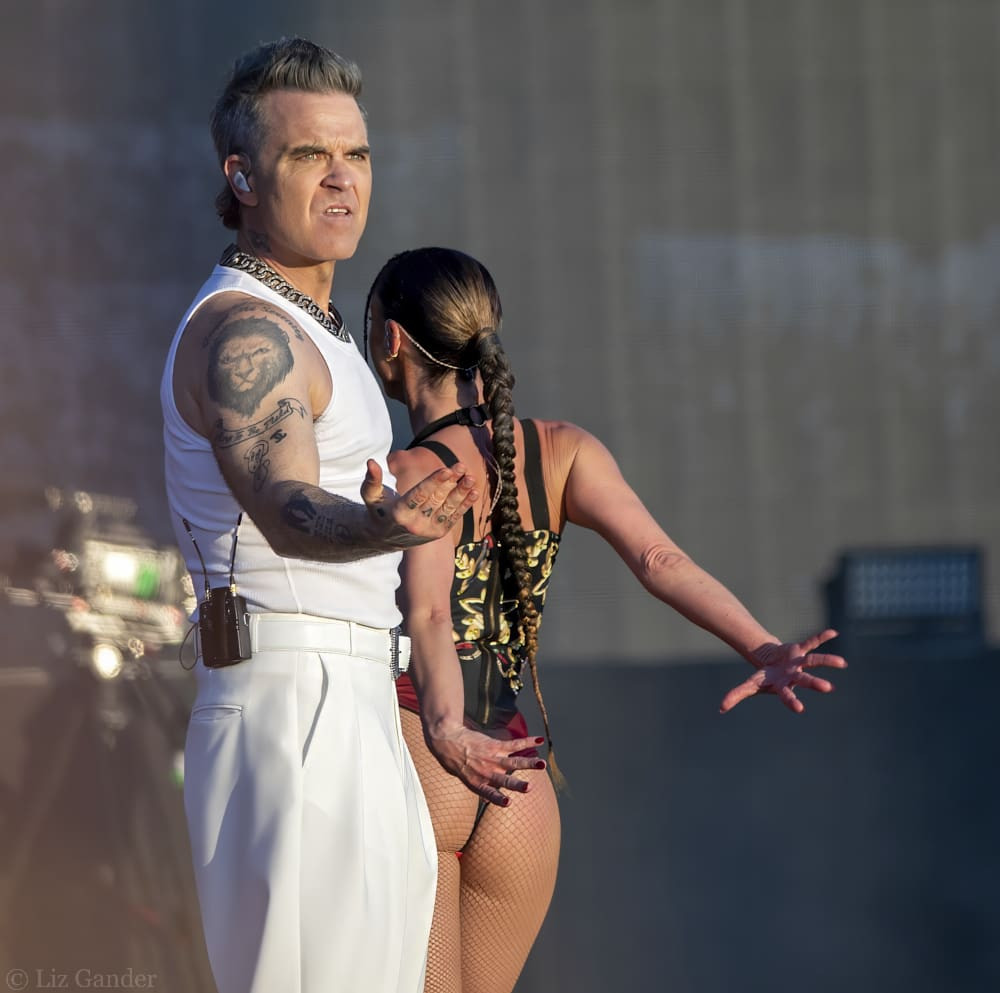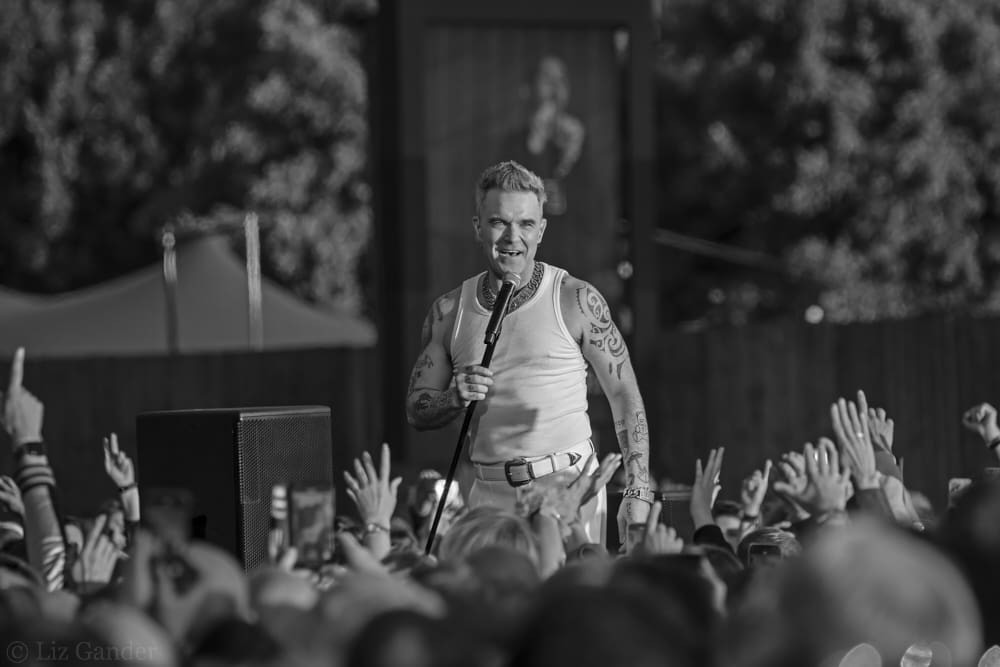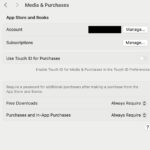Robbie Williams stands as a definitive figure in British pop culture. His career trajectory, marked by both incredible highs and personal challenges, resonates deeply with the UK’s self-image. From his initial fame as part of Take That to his audacious and successful solo career, Robbie Williams has consistently defied expectations.
His journey hasn’t been without its struggles. Open about his battles with addiction and mental health, Robbie Williams in 2024 embodies a seasoned artist who approaches the music industry with both humility and well-earned confidence.
Adding another layer to his narrative is the biopic “Better Man,” a film set to offer a unique perspective on his life story, even casting a monkey in the lead role. As “Better Man” hits cinemas, it’s the perfect moment to delve into the discography that cemented his legendary status.
Here, we explore some of the quintessential Robbie Williams Songs that have defined his career.
Radio
‘Radio’ emerges as an intriguing piece in Robbie Williams’ catalog. Even as a globally recognized pop star, Williams wasn’t afraid to venture into unconventional pop territories, particularly in his mid-2000s era following his collaborations with Guy Chambers. What’s particularly striking about ‘Radio’ is its ascent to number one single status, showcasing his ability to blend the experimental with mainstream appeal.
This track signaled a sonic reinvention for Robbie Williams. Partnering with 80s pop icon Stephen Duffy, they crafted a distinctly robo-pop, electro-infused anthem. Its hypnotic and somewhat mundane programmed music feel oddly forward-thinking, almost anticipating the AI-generated pop landscape of the streaming age. ‘Radio’ stands as a testament to Robbie Williams’ willingness to push boundaries within pop music.
Supreme
“All the best women are married / all the handsome men are gay” – Robbie Williams delivers this memorable line with a playful snarl in ‘Supreme’, a track brimming with retro charm. The infectious string section in the middle? It’s famously borrowed from Gloria Gaynor’s disco classic, ‘I Will Survive’. Legend has it that Robbie, celebrating New Year’s Eve in Switzerland, witnessed a crowd erupting to that very section and decided to incorporate it into his own work. The result is ‘Supreme’, a song that is both audacious and undeniably catchy.
The accompanying music video, with its vintage Formula 1 theme, perfectly complements the song’s and artist’s persona – a blend of confident ego and underlying vulnerability. At this juncture in his career, Robbie Williams was indeed in a pole position, and ‘Supreme’ only solidified his reign in pop music.
Strong
The term ‘anthemic’ is often overused in music journalism, but in the case of ‘Strong’, it’s genuinely fitting. This Robbie Williams song captures a moment of personal vulnerability amidst overwhelming fame. Written in response to an unsettling encounter with overly enthusiastic fans in Cologne in 1999, ‘Strong’ paradoxically became a bold, chest-thumping singalong. Sprinkled with wit and pop culture references, the song showcases Robbie’s ability to turn personal experiences into universal anthems.
Its anthemic quality was further underscored when Robbie Williams performed at the One Love Manchester benefit concert in 2017, changing the lyrics to “Manchester we’re strong / we’re strong / we’re strong” in solidarity with the victims of the Manchester Arena bombing. This adaptation cemented ‘Strong’ as more than just a pop song; it became a symbol of resilience and unity.
 Robbie Williams © Liz Gander LGA_1678-2.jpg
Robbie Williams © Liz Gander LGA_1678-2.jpg
Alt text: Robbie Williams performing live in a black shirt, showcasing his dynamic stage presence and connection with the audience.
Let Love Be Your Energy
If the ‘Cool Britannia’ movement of the late 90s echoed the 1960s, then ‘Let Love Be Your Energy’ by Robbie Williams can be seen as a nod to The Beatles’ psychedelic and spiritual explorations. Think ‘Rain’ or ‘Tomorrow Never Knows’ – songs that delved into deeper, enigmatic lyrical territories. With lines like “every tear that you cry / will be replaced when you die,” and a chorus exalting the power of gentleness and love, ‘Let Love Be Your Energy’ ventures into more profound themes for Robbie Williams.
Even with its enigmatic lyrics, the song is ultimately a clear burst of youthful positivity. Paired with a racy music video, ‘Let Love Be Your Energy’ remains a vibrant and uplifting track, still capable of resonating with audiences decades after its release. It’s a testament to Robbie Williams’ versatility in tackling both lighthearted pop and more introspective themes within his music.
She’s The One
Robbie Williams’ musical vision often demands a grand scale, and ‘She’s The One’ is a perfect example of his ability to create expansive, emotionally resonant songs. This track has become a staple at weddings, a quintessential first dance choice, and for good reason. ‘She’s The One’ encapsulates the universal feeling of longing and finding “the one.”
The lyrics are filled with yearning, and Robbie Williams delivers a performance that feels both vulnerable and sincere. What prevents ‘She’s The One’ from veering into pure sentimentality is its palpable sincerity. It conveys a genuine belief in the idea of a soulmate, making it a song that feels both deeply personal and universally relatable. Robbie Williams, with his characteristic charm, crafts a ballad that resonates across generations.
Let Me Entertain You
Frequently heard in football stadiums, ‘Let Me Entertain You’ by Robbie Williams takes on a different tone. It presents a somewhat edgy narrative of a man attempting to persuade a woman to be unfaithful. This raucous anthem, while drawing inspiration from 90s Britpop, carves its own path. As the final single from his debut album Life thru a Lens, ‘Let Me Entertain You’ was intentionally crafted to evoke the energy of The Who. Robbie Williams and songwriter Guy Chambers, after watching The Rolling Stones’ Rock ‘n’ Roll Circus, aimed to capture that raw, thrilling energy.
The result is a high-octane track that peaked at number three and quickly became Robbie Williams’ signature live opener. ‘Let Me Entertain You’ showcases his rockstar persona, blending theatrical flair with musical dynamism.
Feel
It’s easy to overlook just how monumental ‘Feel’ was for Robbie Williams at its release. As the lead single from Escapology, it not only topped charts across Europe but also achieved the remarkable feat of becoming the most played song on European radio in 2003. Its power lies in its raw honesty and introspection, a departure from Robbie’s earlier, more overtly boisterous image. ‘Feel’ revealed a deeper layer to the performer, showcasing vulnerability beneath the bravado.
In ‘Feel’, Robbie Williams openly addresses his disconnection from fame. The orchestration is lush and complements the confessional lyrics perfectly. Crucially, the chorus possesses the same soaring, singalong quality that made ‘Angels’ such a massive hit. ‘Feel’ stands as a testament to Robbie Williams’ ability to evolve and deliver deeply resonant pop songs.
It’s Only Us
Released as a double A-side with ‘She’s the One’ and also serving as the theme song for FIFA 2000, ‘It’s Only Us’ is often a forgotten gem in Robbie Williams’ extensive catalog. This is unfortunate, as few tracks capture such uninhibited, raw energy within his discography. ‘It’s Only Us’ sounds like Robbie Williams at his most unleashed, fueled by pure exhilaration.
Lyrically, ‘It’s Only Us’ might lean towards the nonsensical, but when an artist is clearly having this much fun, it hardly matters. The sheer exuberance and infectious energy of the song are captivating. ‘It’s Only Us’ is a reminder of Robbie Williams’ capacity to create music that is purely about joy and unadulterated fun.
Come Undone
Escapology, Robbie Williams’ fifth studio album, was marked by introspection and moments of nihilism, receiving mixed critical reception upon release. However, the singles from the album, particularly ‘Come Undone’, remain some of his strongest work from the 2000s. ‘Come Undone’ arguably stands out as the most compelling of the bunch.
The music video for ‘Come Undone’ is stark, depicting Robbie Williams succumbing to the excesses of alcohol and drug use, visually reinforcing the song’s themes. Lyrically, the track deconstructs his own ego, dismantling the carefully constructed stage persona (“Do another interview / Sing a bunch of lies / Tell about celebrities that I despise”). While the production might sound dated to some ears, at its core, ‘Come Undone’ is a powerful rock ballad that confronts the darker aspects of fame.
No Regrets
Released in November 1998, ‘No Regrets’, the second single from I’ve Been Expecting You, is a searing and cathartic track deeply rooted in Robbie Williams’ departure from Take That. It’s a song that simmers with darkness, anger, and a profound vulnerability. ‘No Regrets’ serves as a perfect counterpart to the later track ‘Feel’, exploring similar emotional landscapes but from a different perspective.
‘No Regrets’ achieved chart success during a time when Robbie Williams and Nicole Appleton were in a relationship, reaching Number 4 in the UK charts. Co-written with Guy Chambers, the song features subtle backing vocals from Neil Tennant and Neil Hannon – an unexpected yet effective combination. The simmering tension and explosive atmosphere of both the song and its video vividly reflect the self-destructive period Robbie Williams was navigating, marked by drug and alcohol abuse.
Angels
‘Angels’ is undeniably the Robbie Williams song that altered the trajectory of his solo career, propelling him to superstardom. This epic power ballad, released in 1997 as his fifth solo single post-Take That, arrived at a crucial juncture. His solo career was struggling, largely due to his well-documented struggles with addiction.
Co-written with Guy Chambers, Robbie Williams himself acknowledged that his career was “falling off a cliff” and he was on the verge of being dropped by his label. ‘Angels’ became his salvation and subsequently his best-selling single. An anthem for the masses, ‘Angels’ showcases Robbie Williams at his vocal peak and at his most vulnerable. This song marked a coming-of-age moment for the Stoke-born singer, solidifying his evolution into a singer-songwriter capable of creating enduring, impassioned tracks.
Rock DJ
If one song could encapsulate the essence of Robbie Williams, it would likely be the tongue-in-cheek anthem, ‘Rock DJ’. Cheeky, provocative, and bursting with energy, ‘Rock DJ’ mirrors Robbie Williams’ own persona.
‘Rock DJ’ is a testament to the power of catchy hooks, anthemic choruses, and playful lyrics. However, the song’s initial impact was almost eclipsed by its controversial music video, featuring graphic nudity, gore, and cannibalism. A stark contrast to his boy band origins, the video was nearly banned by the BBC and came with a trigger warning on Robbie Williams’ website.
Whether driven by the attention-grabbing video or the undeniable quality of the song itself, ‘Rock DJ’ became Robbie Williams’ fourth number one single and his seventh consecutive top 10 hit. ‘Rock DJ’ further solidified the songwriting prowess of Williams and Chambers, proving their ability to craft unforgettable number-one hits.
 Robbie Williams © Liz Gander LGA_1994-2.jpg
Robbie Williams © Liz Gander LGA_1994-2.jpg
Alt text: Close-up portrait of Robbie Williams smiling confidently, highlighting his charismatic personality and approachable demeanor.
Ego A Go Go
Taken from his highly successful solo debut album, ‘Ego A Go Go’ is a vibrant burst of post-Britpop energy. Drawing inspiration from Blur, it’s a sassy, indie-disco stomper. Beneath the playful surface, ‘Ego A Go Go’ is rumored to be a pointed jab at his former Take That bandmates, specifically Gary Barlow, critiquing perceived egotism in the vein of a ‘How Do You Sleep?’ style diss track.
Looking back from a 2024 perspective, ‘Ego A Go Go’ still resonates with a fresh energy. Robbie Williams’ songwriting in this track feels more enduring than some of his contemporaries who were considered more critically acclaimed at the time. With Robbie Williams and Gary Barlow’s relationship now reconciled, the song’s original rancor feels somewhat out of place. Regardless, ‘Ego A Go Go’ remains a standout deep cut within Robbie Williams’ early solo work.
Somethin’ Stupid
There was a period when Robbie Williams reached a level of fame that was almost incomprehensible. His popularity was immense, appealing across generations. He essentially reinvented the ‘goes swing’ album concept for a new millennium, achieving phenomenal commercial success.
‘Somethin’ Stupid’ stands as the crown jewel of his swing era, a testament to his audacious approach to music. Originally a duet by Frank and Nancy Sinatra, Robbie Williams re-recorded it with Nicole Kidman, then a major Hollywood star. The result is a breathy, retro-fetishistic piece, delivered with a knowing wink. ‘Somethin’ Stupid’ also achieved the coveted Christmas Number 1 spot, a significant cultural marker at a time when physical CD singles still held considerable sway. It’s a song that encapsulates Robbie Williams’ ability to blend genres and maintain his chart-topping dominance.
Millennium
The Millennium era was a unique cultural moment, and ‘Millennium’ by Robbie Williams perfectly captures its spirit. Amidst global anxieties and excitement about the year 2000, Robbie Williams tapped into the zeitgeist by associating himself with the James Bond mythos. ‘Millennium’ is essentially Robbie Williams embodying James Bond, blurring the lines between grand ambition and self-aware humor.
The music video is filled with in-jokes and self-deprecating humor, while the song itself boldly aligns Robbie Williams with what was then hyped as “The Greatest Event In Human History.” Remarkably, ‘Millennium’ still holds up today, a testament to its catchy melody and its clever encapsulation of a specific cultural moment.
The Better Man (Original Motion Picture Soundtrack) album is also out now digitally via Columbia Records with a physical release to follow which can be pre-ordered here –https://betterman.robbiewilliams.com/


